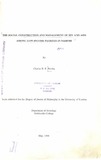| dc.description.abstract | This study seeks to explore the ways HIVIAIDS has been socially constructed and
managed in Nairobi. The reality of AIDS as a disease of the body with debilitating, and fatal consequences as constituted through biomedical discourse is unchallenged in this study. But in adopting a more subjective, interpretative sociological approach, this study focuses on AIDS as an illness. Theories drawn from medical sociology, and the sociology of health and
illness are used to illuminate this distinction. The study uses data from 29 interviews and 127
questionnaires given by asymptomatic and symptomatic patients presenting in four specialised
treatment clinics in Nairobi, between January and August, 1992. These are augmented with
field notes, and observations.
The study finds that the social management of HIV/AIDS in Nairobi is experienced as
a problem because of the -w.aysin which HIVIAIDS has been socially constructed in a culture
of denial. Despite high awareness of the specific ways in which HIV/AIDS is transmitted,
AIDS is still treated with fear, and carries a host of negative symbolic, and sexual meanings.
Those diagnosed mv positive acquire a permanent spoilt identity, and this adversely affects
their social interactions, sexual relations, jobs opportunities, their quality of health care, and
the ways they are treated even in death. This generates tensions between the public and HIV
positive people. The wider community feeling that HIV positive people are viewed as better
managed through isolation, and ostracism, prompts HIV positive people to resort to
impression management strategies of concealing and denying their HIV sero-status in a bid
to widen the scope of their survival chances.
This study also questions the viability of government health promotion programmes which
present information supply on HIV transmission and safer sex promotion campaigns as
offering a solution to the HIV/AIDS problem in Kenya. Evidence in this study shows that,
notions of sexuality in Kenya encourage sexual risk-taking, and undermine safer sex practices
even when risks of HIV infection are evident. Notions of vulnerability and invulnerability to
lIIV are enabled through lay health beliefs which have produced a range of constructions of
safer sex which are not congruent with biomedical notions of safer sex.
This thesis concludes that, through the ways in which HIV/AIDS has been socially
constructed, a national culture of denial and concealment of AIDS has emerged in Kenya, and
this will continue to have serious implications for the control and management of AIDS in
the country | en |

